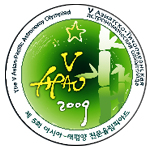International Olympiads
International Olympiads
Asia-Pacific Astronomy Olympiad(APAO)

Logo of the 5th APAO
Sponsor
As in the case of the IAO, the APAO is sponsored by the Olympic Coordinating Council (OCC) under the aegis of the Euro-Asian Astronomical Society (EASS), and the operation regulations of the APAO conform to the regulations of the International Astronomy Olympiad (IAO).
Objectives
Astronomy has performed a fundamental role in the progress of humanity, and its importance has increased even further in the 21st century. Astronomical knowledge is not only a critical element of human civilization and culture, but also a core component in the process of molding the life values and approach to thinking among contemporary teenagers. APAO was founded specifically for teenagers in the Asia-Oceania region in pursuit of the following objectives.
- Encouraging talented young students to pursue academic studies and research in astronomy
- To disseminate astronomical knowledge among teenagers and to improve the education of astronomy
- To promote creativity and imagination among teenaged students
- To foster an attitude of inquiry in pursuit of truth along with fraternity and friendship.
History
In response to the proposal made by the IAO chairman Dr. M.G. Gavrilov on April 25, 2005, the EAAS Council approved the establishment of APAO on June 2, 2005. The 1st APAO was held from December 4-11, 2005 in Irkutsk, located in the eastern Siberian region of Russia. Korea attended the 1st APAO represented by two students, respectively in middle school and the high school, who were among contestants from a total of 5 participating countries. Korea was proud to host the 5th APAO in Damyang, Jeollanam-do Province from October 7-14 2009, with total 88 participants from 9 countries.
Eligibility for Participation
■ Each participating country can be represented by 4 juniors (age 14-15) and 4 seniors (age 16-18).
■ The participants cannot be participants in the IAO of the same year.
■ Countries with part of its territory located in the Asia / Oceania region (e.g. Russia, Kazakhstan, Turkey, etc. in Asia and the United States in Oceania) can participate with a team consisting of students and a leader who are residentsin the said regions located in Asia / Oceania.
■ All participants (juniors/seniors) must be age 14 or older as of December 31st of the year of the Olympiad
I.e. born before December 31, YYYY-14 for the Olympiad in the year YYYY.
Juniors
- Must not have previously participated in IAO or APAO
- A student in the graduating year of high school cannot participated as a junior status
- Must be age 15 or younger as of January 1st of the year of the Olympiad I.e. born after January 1, YYYY-15 for the Olympiad in the year YYYY
Seniors
- Students in the graduating year of high school can participate only as senior status
- If the student has never participated in any previous IAO or APAO: cannot be older than 18 as of January 1st of the year of the Olympiad
I.e. born after January 1st of YYYY-18 for the Olympiad of the year YYYY - If the student has participated once in a previous IAO or APAO: cannot be older than 17 as of January 1st of the year of the Olympiad
I.e. born after January 1st of YYYY-17 for the Olympiad of the year YYYY - If the student has participated twice or more in any previous IAO or APAO: cannot be older than 16 as of January 1st of the year of the Olympiad
I.e. born after January 1st of YYYY-16 for the Olympiad of the year YYYY
Dates and Location
The Olympiad is held each year between August and December around the time of the IAO (September 22~November 22). The hosting country must be a country participating in the APAO located in the Asia and Oceania region, ranging from the geographical / administrative border of Asia and Europe/Africa in the west up to a longitude of around 141 W in the east
Format of Competition
■ Theoretical Round : 4 hours in duration, consisting of a total of 5-6 questions for a perfect score of 40-48 points
■ Practical Round : 3-4 hours in duration, consisting of a total of 1-2 questions for a perfect score of 20 points.
The questions are based on actual research data provided by the hosting institution
■ Observational Round : An outdoor, nighttime competition using the naked eye or small-scale telescopes.
The location may be changed to indoors in the event of rain. Composed of a total of 1-3 questions (excluding sub-question sets), for a perfect score of 20 points.